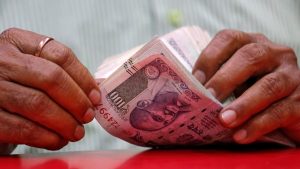Advertising spending is growing at 11.8% in 2023 in India, reveals Magna Global advertising forecast
India along with China projected to contribute about half of global GDP growth in 2023 and 2024. After a 7.3% expansion in 2022, the IMF in its October 2023 update predicts a slight deceleration in economic activity with real GDP growth of 6.3% in 2023. The GDP has been revised up by 0.4% from the April 2023 update as economic growth remains robust. India is reliant on its domestic demand, private consumption, and investment spending for its growth. The overall sentiment is upbeat though the market remains complex with local and global pressures. The large consumer base and aspirations of the young Indians work in its favour.
Inflation remains vulnerable to rising food and fuel prices. The task of bringing inflation back to target is a priority for the government through macroprudential measures and monetary policy tightening. After a 6.7% in 2022, inflation though expected to ease down to 5.5% in 2023 is still in the upper bracket of the central bank’s desired range.
Consumers are increasing their spending, primarily driven by the young working adults who are investing in experiential-led categories like travel, auto, and entertainment. Impassable categories like CPG, continue to see higher spending. Second half of 2023 which includes festive spending, ICC World Cup and government spending before the upcoming national elections early next year is expected to contribute 10-12% incremental growth to Adex.
“In the first half of 2023 advertising spending grew by 9.6%, accelerated in the second half of 2023 to 13.8%. The recovery is driven by festive spending and marquee events like ICC WC and elections. Globally, Traditional media owners’ ad revenue growth is slowing down, while in India both linear (9.9%) and Digital formats (14.5%) are growing. Traditional formats will still be the largest, at least till 2027, though pure play digital is driving the adex. Non-linear formats (AVOD, Digital Newspaper, Podcasting & DOOH) of TMOs are growing steadily in double digits and contribute 5% to the total revenue of TMOs,” Venkatesh S, SVP, director – intelligence practice, MAGNA India, said.
CPG, auto and fintech are the most dominant sectors contributing to India’s adex growth followed by government, communication, travel, and real estate. Retail including e-commerce, financial services, Media and entertainment and Apparel will see average growth, Startups that have been the mainstay for all tent poles properties have either cut budgets or moved to performance marketing rather than brand marketing. With the new retrospective taxation policy on gaming, brands have exercised caution in spending.
In the last few years, the Government has fostered the digital ecosystem with inimitable assets like Aadhar, UPI & DigiLocker taking digital public goods to a higher level. Also, driven by a rising internet user base and affordable devices, currently 881mn have access to the internet as of March 2023, according to TRAI. The government has also initiated labs to develop applications using 5G service to ramp up digital business services and this will have a rub-off on the digital advertising economy. In 2023, overall digital ad spending will grow 14.2% to top Rs 50,000 crore. India takes the lead in Mobile growth followed by the US and Brazil according to a report by Adjust and it is a mobile-first market. The share of Mobile within digital will touch 59% this year. There are 467mn Social users in the country and it has been the bellwether for digital growth with 19% growth. Total Video registers 16% growth. It is noteworthy that OTT players display robust growth trends driven by increased CTV subscribers, content choices and local language play. The OTT subscription is estimated to be at five crore this year. In 2024 total digital growth is estimated at 13.9% to touch Rs 56,900 crore.
Overall Television is growing but Pay TV is facing challenges from Free Dish, FTA channels and OTT in terms of subscriber base. Following the implementation of the amended New Tariff Order (NTO) 3.0 which allowed broadcasters to hike channel access prices, subscribers have moved out of Pay TV being a price-sensitive market. Despite this, Television is still the largest video medium with over 900 million viewers and daily viewing at 222 minutes. In the light of rising consumption of short-form content along with web series and the availability of TV shows on OTT platforms, the time spent indicates TV is holding onto its audiences. The proposed broadcast bill extending its purview to include OTT will help eliminate disparities to the advantage of Linear television. Also, there remains a considerable growth opportunity for TV and advertisers are keen to cover the vast population of live audiences. Television ad revenues in 2023 will grow 8.9% to reach an estimated Rs 36,500. In 2024 TV advertising is estimated to grow 9.9% to reach Rs 40,100.
The newspaper has risen to be the most credible source of information. With 39.1 crore copies (2021-22) circulated every day and language print taking the lead, the geographical spread and the audience size present a massive marketing opportunity. The advertising growth is on the back of recovery in volumes; however, the yield remains a challenge. In 2023, ad sales revenue will grow 8.1% to Rs 17,500 crore . Growth is expected to continue in 2024 to drive an increase of 9%, Rs 18,700 crore .
Radio’s road to recovery has been a gradual one. Despite the volumes crossing pre-covid levels, yield has been a struggle though ad rates have flared up slightly. The industry is battling challenges of measurement limitations and audio streaming apps gaining a user base. Radio players are offering airtime bundled with off-air solutions to make up for the revenue. Government-led allowance of news broadcasts and an increase in Government advertising rates will accelerate ad spending. Overall, advertising revenues are growing by 12.1% to reach Rs 1800 crore, which is 80% of the pre-COVID market size. In 2024, radio is estimated to grow 11%, Rs 2000 crore.
OOH advertising has consistently grown during the pandemic as audience movement continues to ascend. Rising roadside DOOH screens in metros and state capitals, and substantial presence in ambient spaces have added to demand, leading to growth in DOOH spending which contributes 5% to the total. In 2023 OOH revenue increased by 26.7% valued at Rs 3000 crore ($382mn) reaching 90% of the pre-COVID market size. This pace will be sustained for a few more years and in 2024, OOH will exceed 2019 revenues adding 16% to the size. In-cinema advertising is up sharply as audiences are flocking to cinemas. State-of-the-art technologies like IMAX and Dolby Atmos have transformed movie-watching into a truly awe-inspiring experience and this has been another reason for audience draw. It will cover 74% of 2019 market size by the end of 2023 with an impressive 43% growth to reach Rs 800 crore. In 2024, the growth is estimated to be 19%.
“India continues to script its unique narrative in the advertising landscape, boasting robust growth across diverse mediums despite evolving consumer preferences and market dynamics. The promising trajectory across television, digital, radio, and out-of-home channels signifies the dynamic nature of our advertising landscape. I am optimistic about the future as India’s advertising story unfolds, driven by innovation, adaptability, and a burgeoning consumer base,” Hema Malik, chief investment officer, IPG Mediabrands India, said.
Follow us onTwitter,Instagram,LinkedIn,Facebook



